There are many types of flour on the market, all of which are made by grinding different kinds of cereal grains, seeds or root vegetables. Plain white flour has the longest shelf life and specialty whole grain flours have the shortest, but all of them are perishable.
Types of Flour
The most common types of flour include all-purpose, cake, pastry and whole wheat, which are all made from the kernels of wheat. Whole wheat flour is derived from all parts of the kernel, including the bran, germ and endosperm. Other wheat-based flours are only made with the kernel's starchy endosperm. Because the germ is high in fat, whole wheat flour tends to spoil more quickly than other types of wheat-based flour. Non-wheat flours are made from other ingredients, including rice, rye, oats, buckwheat, corn and potatoes. Just like most of the ingredients from which they are derived, all forms of flour eventually spoil, which is why manufacturers list an expiration date on them.
Proper Storage
How you store your flour, even if it's still sealed, can impact how quickly it goes bad. Air, heat and moisture can all cause your flour to spoil before its expiration date, even when the package hasn't been opened. Not all packaging is air-tight so you should place your flour bag inside an air-tight bag or container to keep it fresh. Store it in a cool, dark cabinet. Placing the bag in your refrigerator or freezer can help the flour last even longer. Air-tight, cold storage also keeps grain-eating pests, which can infest an unopened package, out of your flour.
Flour Shelf Life
One way to determine whether your flour is still good is to check its expiration date. Flour can also last past its expiration date, especially if you haven't opened it and stored it properly. Most types of flour last six to eight months past their expiration dates, while whole wheat and self-rising flour last four to six months after their expiration dates. Corn meal flour can even last up to 12 months past its expiration date. Unfortunately, if any type of pest, like flour beetles, infested your flour before you stored it, they will cause it to spoil. Always discard flour infested with any type of pests.
Quality Considerations
If you are unsure whether your flour is usable, inspect and smell it. Flour that is still good should smell slightly sweet or have no scent at all. There should be no bugs, mold or discoloration present. If the flour smells musty, oily or downright unpleasant, toss it and buy new flour. Even if your flour is still good, but around one year old, it may produce less gluten when you use it for baking. This affects the texture of the finished baked goods, making them more brittle, so only use recently purchased flour for baking soft cookies and bread.
Related Articles

Can You Use Musty Smelling Flour?
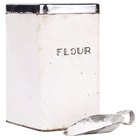
Does Flour Expire?
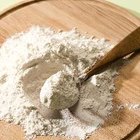
Does it Help to Keep Flour in the ...

Does Flour Get Old or Go Bad?
How to Keep Flour for Long-Term Storage
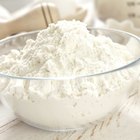
How to Store Flour
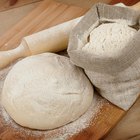
How to Store Flours & Grains Without ...
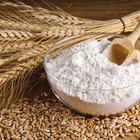
Differences Between Bleached Flour & ...
How to Tell If Flour Is Rancid

Is Soy Flour Healthy?
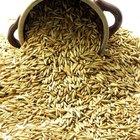
How to Store Oat Bran

Psyllium Husk & Gluten

Does Unbleached Bread Flour Make ...

How Do You Keep Bugs Out of Baking ...
How Long Can Flour Be Stored in Mylar ...

Is Corn Flour Considered Whole Grain?

What Are the Functions of Flour in ...

Does Flour Spoil?
Is Unbleached Flour the Same as ...
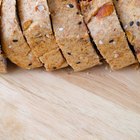
How Long Will Vital Wheat Gluten Last?
References
Writer Bio
Based in Las Vegas, Susan Paretts has been writing since 1998. She writes about many subjects including pets, finances, crafts, food, home improvement, shopping and going green. Her articles, short stories and reviews have appeared on City National Bank's website and on The Noseprint. Paretts holds a Master of Professional Writing from the University of Southern California.